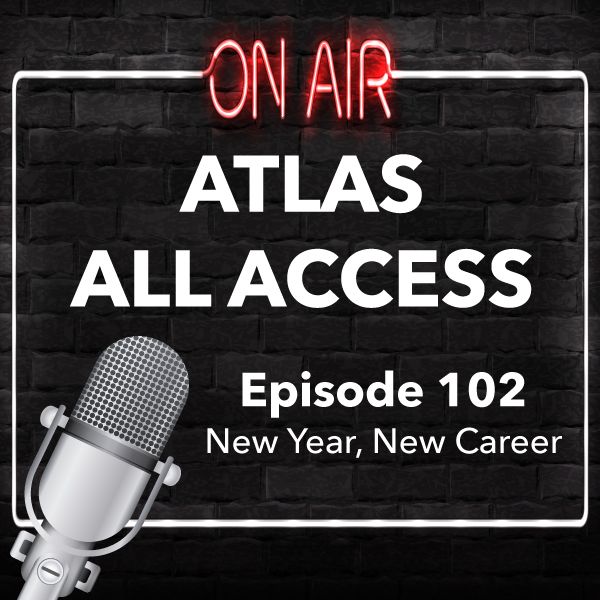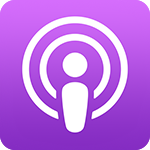
New Year, New Career - what do you need to do to be a travel nurse? - Atlas All Access 102
01-16-2020
Have you considered your #NewYearNewCareer resolution? If you've thought about being a first-time #traveler, *now* is the time to make the change.
Whether you're considering becoming a #TravelNurse, switching specialties, or even just looking to improve your skills, you don't want to miss this episode!
We cover the most important takeaways for anyone looking at that #NewCareer in the #NewYear. Thinking of making a change? This is the place to start.
Rich Smith: Hashtag New Year, New Career. Sounds like an internet thing, right? But there might be something to it. On this episode we're going to talk about what it would take for you to change your career or do something different or maybe take the leap and start traveling in 2020. Atlas All Access starts now.
Rich Smith: Adam Collette joins us again, I thought it'd be fun and I did not tell him the topic ahead of time. I want to get your fresh take on this.
Adam Collette: Okay.
Rich Smith: So I've got six different bullet points here.
Adam Collette: Okay.
Rich Smith: On new year, new career, right?
Adam Collette: New year.
Rich Smith: Everybody's all about resolutions and whatever, and we can talk about that here at the end, but if you as a healthcare traveler or a healthcare professional, are thinking about changing specialties, going from inpatient to outpatient, or start traveling or whatever...
Adam Collette: Sure.
Rich Smith: Here are six bullet points that I came up with that we could talk about that might help you along the way.
Rich Smith: Bullet point number one: reflect on the previous year; take time to consider what went right, what didn't, what outside factors are involved. So kind of inventory your life.
Adam Collette: Yeah, and I think especially for nurses is it can be week by week, month by month shift by shift, of how much they love their job and love what they're doing or obviously hate what they're doing, or need a change more than that. So I think it's always important to step back and look at though, why are you doing this and what are your goals for the future of, is this still your passion? Is this still something you love doing or do you need to change a setting within healthcare, traveling or a different unit, to continue to fulfill what drives you as being a nurse?
Rich Smith: Let's say it's a nurse for example, that has worked at a perm job for three, four, five years maybe, and has heard about traveling or whatever, however they've come upon it, what's the one piece as a recruiter, maybe not trying to recruit them necessarily or get them to take a job or whatever, what's the one piece of advice that you would give them? If, okay, if this is what you're looking at, you've got to do this first.
Adam Collette: Yeah. You know, I think you mentally just have to go for it. You need the change of mind of, I can do this. The job is going to be the job of some sense, they might do things differently, but I just need to take the leap of faith and and put it out there.
Rich Smith: Gotcha. Okay. Number two: inventory your skills. I think my little note that I put here was review what you've learned. How has it made you better? Where are you deficient? What do you need to get better at?
Adam Collette: Yeah. I think this is a good one just for the fact that I think it's maybe one of the most challenging things with traveling, is that you might have worked perm for four or five years and done procedures a certain way, or you know, certain hospitals or docs use medicines in different ways, where you have to be open-minded of what might change in the travel world. And you know, I think it's a challenge, but it's also, I feel that nurses and healthcare providers are always wanting to learn. Like I think that's something cool that with their brains is they always, they want to learn the next procedure or the coming medicines or the changes in things that are, that are going to make healthcare better of, of going forward. But I think that's one of the cool things of traveling is, is you're going to learn different ways of doing the same thing to help patients.
Rich Smith: And I think one of the things you keyed on there was not only just like how healthcare is evolving and the things that they're learning, but changes outside of maybe their regular routine in their hospital. Like that's one of the things I hear about a lot is, you can never go into a place and say, "well, where I came from, we did it this way." Every place does it differently or whatever, and just be open to those changes and to learn. It may not be the best way or most efficient way. Maybe you came from the most efficient way quite honestly, but they're doing it this way here. Kind of got to do it that way.
Adam Collette: Yeah. And there's nothing wrong with questioning it. You know, "hey, I didn't do it this way" versus "this is the wrong way, my way's the right way. But once again, it goes back to the learning piece of, "Hey, why do you do that? We didn't do it this way. What are the procedures or the steps of doing this, so that I'm doing it correctly or following your protocol?" So once again it's all about just handling those situations correctly.
Rich Smith: okay, so bullet point number three: engage in career research. So, and I think this one is more to, if you're looking to travel for the first time, there is a ton of information out there. Maybe not all of it's good, maybe you know, whatever, you've got to figure out what applies to you.
Adam Collette: Yeah, absolutely. And I think it's even like changing specialties on there. You know, I talk to a lot of people or I've had travelers that "Hey, I'm going back home, I'm going to change specialties." And they go back home and you know, they were in the ER and now they're in the OR and they're two, three months in, and it's like they jumped in without doing the research of "Hey, now I'm going to be super bored because all I'm doing is one or two cases a day where I was used to taking care of four ER patients." So I think you're 100% right to do the research of do I really know what I'm getting into? Same thing with traveling. Read up, follow the Facebook boards, be a fly on the wall, be a sponge of gathering that information to make yourself as successful as you can be.
Rich Smith: Yep. All right. Number four: ask a fellow travel nurse or traveling healthcare professional and let's see, or you know, MRI or echo or wherever, wherever you're working in therapy, you probably work with one. Ask them.
Adam Collette: Yeah, I think it's the most valuable piece as a traveler is to find some sort of mentor. And I think I learned that mostly from Patty. For a long time she's been a mentor to a ton of people, but it's just having somebody in your corner, of saying does this sound right? Is this correct? When I talk to newbie travelers, I always ask them, "Hey, do you need somebody? Obviously I've worked with 200, 300 travelers in the past. I've got some great travelers on my desk right now. Are you traveling in an RV? Is this your first time? Have you ever been to the Northeast? Let me find somebody from the Northeast to give you, that you can just reach out to if you have any issues there, they're obviously in the area and know the area probably a lot better than me."
Adam Collette: So I think finding that mentor is just huge to have somebody in your corner. Obviously your recruiter, your company should have your back as well. But having a mentor obviously that is doing the nursing job as well, that are going to know those procedures when they go bad or they're different, that they can bounce questions off as well and, and just have a sounding board and feel comfortable with doing that.
Rich Smith: There are so many things along the way that maybe as someone new that you haven't thought of. And having that mentor in place to talk about housing stipend, or you know in this case it would be like if you're traveling in an RV and something goes wrong with the black tank or whatever. Like there's so many things out there, you're having that person to pick up the phone and say, "Hey, does this ever happen to you?" Or you know, message on Facebook, "what do you do if this happens?" Or whatever. And then you just get that quick answer back. That's, I think that's invaluable.
Rich Smith: Right, next one: identify your shortcomings. This kind of goes back to the inventory, your skills, right? It's a hard thing to do, but kind of look at who you are in your career and identify, okay, I'm not very good at this. I can do this, this and this just fine, but I'm not good at this. I mean, I use myself for example, and this is why I work with Steve Ryan so well is, I'm more [inaudible 00:08:44] art and he's more of the science. How's that right? Math and I'm more the emotion. And so identify what you're not good at.
Adam Collette: Yeah. And I think one of the big things when you talk about that, is taking your pride and setting it aside for a little bit of, you can be the best nurse in the world, but could you be better? Could you understand things? Being able to be humble, step back, step back out of your shoes and have more of a worldview of what's best for everybody or not just yourself on there. So I think just being humble, setting your pride back and just being able to see where you're at.
Rich Smith: Yep. I agree. All right. Finally, don't be afraid of the unknown. And this totally ties back to your very first answer. You cannot, if you're going to do this or if you're going to change specialties or whatever that is, you can't be afraid of it. You've got to jump in both feet.
Adam Collette: I think anything is possible when you set your mind to it. There's a will, there's a way. There's a lot of cliches out there that you can say, but you just have to have the confidence. And I tell people there's plenty of people that I said will never make it, and five years later, they're still traveling with me, and it's just, maybe they lack some confidence or whatever. But you can do this. You can if you want. Don't, it's not time to say, I wish I would have, I wish I did that. Life's too short. If you want to make that change, traveling, specialty, job, whatever, make that change now do it. Don't be afraid.
Rich Smith: Yep. I agree. That's, I said this back at our ... I always talk to the company at our Christmas party and the whole, when I started writing it, it all came from one phrase, that I never wanted my grave to say, could have been. Never. And I think that could apply to everybody.
Adam Collette: I agree. Totally agree.
Rich Smith: All right, Adam, thank you.
Adam Collette: Absolutely.
Rich Smith: This is a fun topic, so if you have anything else that maybe might help a new person going into a new specialty, changing their ... especially within their hospital or traveling for the first time, we welcome the comments. That would be, that would be awesome.
Adam Collette: Or why you changed specialties and what you went to and how it went.
Rich Smith: Yeah, exactly. I think that would be, that would be a great topic to discuss, especially in the comment section. I think we need, we need to do more of that. So awesome. See you next week.
Adam Collette: Thanks guys.



